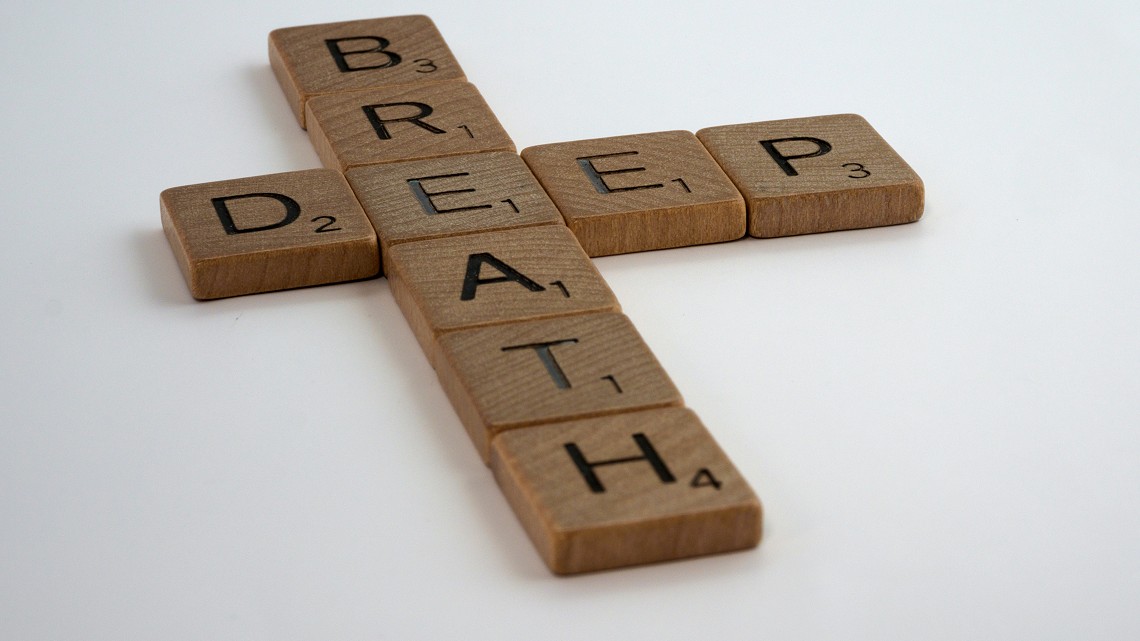Do we Really Know How to Breathe?

Breathing is an unconscious act that keeps us alive but it can be so much more. Here is a quick guide to deep breathing and its benefits.
How to Deep Breathe?
Deep breathing should happen naturally. However for various reasons ranging from your birth to life’s emotional and physical traumas, we forget to take the time to breathe properly.
In order to breathe properly you need to breathe deeply into your abdomen and not just your chest. It should be deep, slow and rhythmic. This should be practiced twice a day everyday, once in the mornings and once in the evenings. You can start with 5 minutes (i.e 10 deep breaths) each and increase to your liking. Fit this exercise into your day however you can. You will notice the benefits more if your do it regularly. Once you will get accustomed to the exercise you will be able to apply it anywhere, in the car at a red light, in front of the computer, on public transports… Find a quiet place where you wont be disturbed. It can be in a chair that supports your head or lying on the floor or bed. Place your arms on the chair arms, or flat on the floor or bed, a little bit away from the side of your body with the palms up. If you’re lying down, stretch out your legs, keeping them hip-width apart or slightly wider. If you’re sitting in a chair, don’t cross your legs. Loosen or remove any tight clothes you have on, such as shoes or jackets. Make yourself feel completely comfortable. Inhale through the nose, imagine your lungs filling up with air from the bottom up (like filling a glass of water), expand your belly, let your belly button pull away from your spine and progressively expand up through the chest. Take your time counting up to 5. When you feel your lungs are full, exhale slowly (counting to 5) through the mouth, pushing the air out from the chest and gently contract your abdominal muscles, pulling your belly button back in towards your spine until you evacuate the remaining air from your lungs. It is important to remember that we deepen respirations not by inhaling more air but through completely exhaling it.

What are the Benefits of Deep Breathing?
Breathing Detoxifies and Releases Toxins Breathing enables your body to release 70% of its toxins. As you activate your diaphragm, venous return and lymph flow is increased. The lymph fluid is responsible for ridding the body of the cells’ debris and also dead cells and other waste. Breathing shallowly can lead to a sluggish lymphatic system and thus poor cleansing of the body’s tissues and cells. To compensate, the other organs will overwork which will more easily lead to illness. When you exhale, you release carbon dioxide that has been passed through from your bloodstream into your lungs. Carbon dioxide is a natural waste of your body’s metabolism.
Breathing Relaxes the Mind/Body and Brings Clarity
When you are stressed, angry, scared or other negative emotion, your body will tense up. Muscle will tighten, there will be an increase in heart rate and shallow breathing. This is a sate dominated by the sympathetic nervous system (which is your adrenaline fight or flight system). As this occurs, you reduce the oxygen transport to your cells. Cells need oxygen to stay alive and function. Better oxygenation of the brain will reduce anxiety levels. Deep breathing also stimulates your parasympathetic nervous system (the system that slows you down and tends to focus on your digestion opposite to sympathetic system) this allows relaxation and sleep (like after a big meal!). We know stress is a big actor in disease so breathe and release the tension!
Breathing Relieves Pain
Have you ever noticed how your breathing changes as you experience or anticipate pain? We tend to hold our breath. However studies show that breathing into your pain helps increase your pain threshold. Deep breathing will also release endorphins which is a natural painkiller.
Breathing Massages Your Organs
During deep breathing your diaphragm moves up into the thorax (exhalation) and down into the abdomen (inhalation). This will massage the stomach, small intestine, liver and pancreas. The upper movement of the diaphragm also massages the heart and lungs. This allows better circulation of blood and lymph around the body, therefore the heart does not have to work as hard to deliver the oxygen to the body’s tissues.
Breathing Improves Posture
Good breathing techniques over a sustained period of time will encourage good posture. It will open your chest, straighten your spine and strengthen your core. When you sit all day in front of a computer or during your commute, you tend to slouch. This switches off your abdominals, stiffens up your spine and therefore restricts the mobility of your diaphragm. Let us not forget that we are spending a lot of time looking down at our phones and tablets, closing of four airways!

Breathing Increases Digestion
As we mentioned before the diaphragm massages the stomach and intestine, it promotes circulation of more oxygenated blood to those organs and therefore better function. The absorption of the nutrients through the stomach and intestine lining will improve leading to healthier tissues. Deep breathing also switches on your parasympathetic nervous system, which activates the digestive system. It also allows changes in pressure in the abdomen, which helps with bowel movement.
Proper Breathing assists in Weight Control
When we are stressed, cortisol is secreted and this releases sugar/glucose in our bloodstream but our digestive system is slowed down and therefore cannot efficiently burn the calories we eat. Deep breathing will activate the digestive system and reduce cortisol levels. If you are overweight, the increase in oxygen through correct breathing will burn up the excess fat more efficiently. If you are underweight, the extra oxygen will feed the starving tissues and glands and organs.
Breathing Boosts Energy levels and Improves Stamina
As you draw air deeper into your lungs the oxygen sent to your tissues through the bloodstream increases. This allows your cells to function better and therefore metabolic reactions improve. This increases energy and also improves stamina. Considering all the points above when you breath properly; your blood and tissues are cleaner, the circulation increases, the stress decreases, the sleep improves, your organs work more efficiently, all that increases your energy levels but also allows you to it more efficiently.

